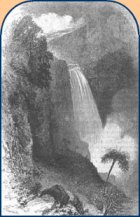
STUDENT PROJECTS
1. Long essay:
In two poem/letters to Susan, Dickinson compares Susan to Peru. Study
these two poem/letters--"Dear Sue. Your
- Riches - taught me poverty!" and "Susan
I dreamed"--and also examine the contextual
material provided from William Prescott's The Conquest of Peru
and other nineteenth-century sources. Write an essay that considers
how Dickinson's invocations of Peru when writing about and to Susan
echo and revise representations of Peru in other mid-nineteenth-century
materials. [This is a rich and subtle question. Make sure you narrow
your topic. For example, you might want to compare the quote from Prescott
on the opening page of this web site and the
two Dickinson poem/letters. All three texts link Peru to economic concerns--the
cost of Peru and the value of its riches. How does Dickinson play on
the language of conquest and economics? Why does she compare Sue to
Peru? Is Sue to be conquered? Is she expensive? Are these poems about
the finality of conquest or the elusive nature of love and desire?]
2. For class discussion:
Read "Some Rainbow - coming from the
Fair!" and "A moth the hue of this"
and "A Drunkard cannot meet a Cork."
Prepare for class discussion by writing a) a paragraph for each poem
that paraphrases the poem, and b) a fourth paragraph that identifies
what these poems share. Consider subject matter, tone, mood, syntactical
features, terms, and references to foreign lands.
3. Journal assignment:
Five of the poems gathered refer to foreign lands while exploring the
nature of desiring what is fleeting or unattainable. For Dickinson,
the unattainable might be spiritual peace or a full grasp of beauty
in nature. Significantly, Dickinson uses foreign lands to represent
the elusive. Read the following poems and write about the use she makes
in each of such places as St. Domingo, Bolivia, India, or Brazil.
- "Flowers - Well - if anybody"
- "Reverse cannot befall"
- "It would never be Common - more I said"
- "Some such Butterfly be seen"
- "I asked no other thing"
4. Short essay:
Read Joan Burbick's article cited in the bibliography.
Write a three page essay that summarizes Burbick's argument and that
uses one of the poems from this article to support or refute Burbick's
suggestions about the "economy of desire" in Dickinson's poems.
